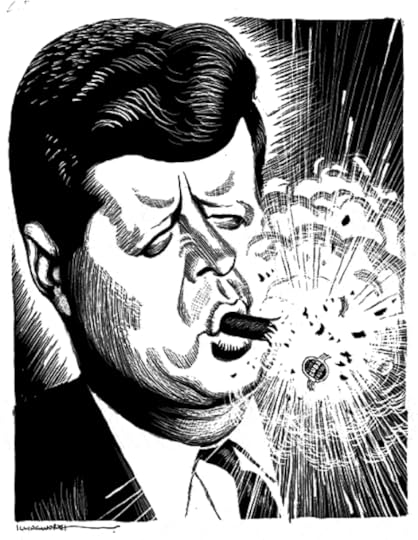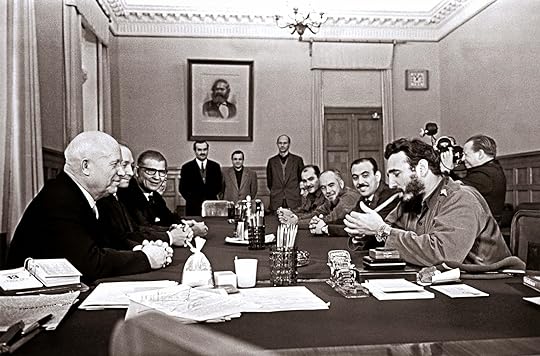What do you think?
Rate this book


732 pages, Kindle Edition
First published February 14, 1995
He used to pimp and pull shakedowns. Now he rode shotgun to History.Whoa, Ellroy's done it again: another 5-star read. So far, that's 5 out of 5 for me. This time, he takes his talent for weaving complex plots and conspiracies from his 50's Los Angeles setting and unleashes it nationwide in an epic re-shaping of the country's turbulent history between 1958 and 1963 as we follow three men who play pivotal roles in the events that ultimately lead to that infamous day in Dallas, Texas on November 22, 1963.
His courage was weakness pushed into grandiosity.Along with the immense amount of historical detail, plot development, and supporting players, Ellroy is able to create three of his most fascinating protagonists who, through their individual fears, dreams, and covetousness, end up creating the history we know today. Ward Littel is an FBI agent who dreams of taking down mobsters and has a fascination with crime-buster Robert Kennedy and his cool-cat buddy Kemper Boyd. Ward is desperate to get rid of his reputation for being a punk bitch, and decides that he'll do anything to gain favor, discovering talents that provide him an opportunity he's never dreamed of. His friend Kemper Boyd is obsessed with the Kennedy family and their high-class status, and starts to juggle multiple secret allegiances with the FBI, the CIA, the KKK, Jack Kennedy, and the Mob in order to get to that same status. Pete Bondurant is a shakedown artist and dope-procurer for Howard Hughes. He's getting tired of the extortion world and sees his job in jeopardy once Howard Hughes starts transforming into a Mormon vampire, so when Kemper and the CIA come calling, he sees a way out and a way to big money. These three guys are intriguing and complicated Ellroy creations, and their arcs and journeys are what really gives the book its heart.
Boyd was now some triple or quadruple agent. Boyd was a self-proclaimed insomniac. Boyd said rearranging lies kept him up nights.Ellroy is constantly experimenting with form and language and it always works for me (but might not work for other people). I'm not sure how he is able to pull this stuff off. It seems like he's so entrenched in the eras that he portrays, and these stories in his head are so desperate to get out, that the words just spill out onto the page. And what's produced is a piece of work that is his and his alone. He is definitely one of a kind. And as usual for Ellroy, there's enough material in this bad boy for three separate books. You would think that something this huge would run away and get too large for the author, but once again, he is able to stick his landing in glorious form and bring it all to an awesome ending. He really knows how to pull off a great conclusion and that's a big factor in my 5-star ratings.
Hughes kept Lenny on the payroll to write a private skank sheet. The sheet would feature skank too skanky for public skank consumption.He is not interested in accuracy, but more interested in how the people in power in our country are just as complicated and enigmatic as we are. But while our complications only really have an effect on us or those close to us, their complications affect the whole country. So watch who you vote for.
The sheet would be read by two skank fiends only: Dracula and J. Edgar Hoover.
It's time to demythologize an era and build a new myth from the gutter to the stars. It's time to embrace bad men and the price they paid to secretly define their time.
Here's to them.





“America was never innocent. We popped our cherry on the boat over and looked back with no regrets. You can't ascribe our fall from grace to any single event or set of circumstances. You can't lose what you lacked at conception.
***
The real Trinity of Camelot was Look Good, Kick Ass, Get Laid. Jack Kennedy was the mythological front man for a particularly juicy slice of our history. He called a slick line and wore a world-class haircut. He was Bill Clinton minus pervasive media scrutiny and a few rolls of flab.
Jack got whacked at the optimum moment to assure his sainthood. Lies continue to swirl around his eternal flame. It's time to dislodge his urn and cast light on a few men who attended his ascent and facilitated his fall.
They were rough cops and shakedown artists. ... wiretappers and soldiers of fortune and faggot lounge entertainers. Had one second of their lives deviated off course, American History would not exist as we know it.
It's time to demythologize an era and build a new myth from the gutter to the stars. It's time to embrace bad men and the price they paid to secretly define their time.
Here's to them.”